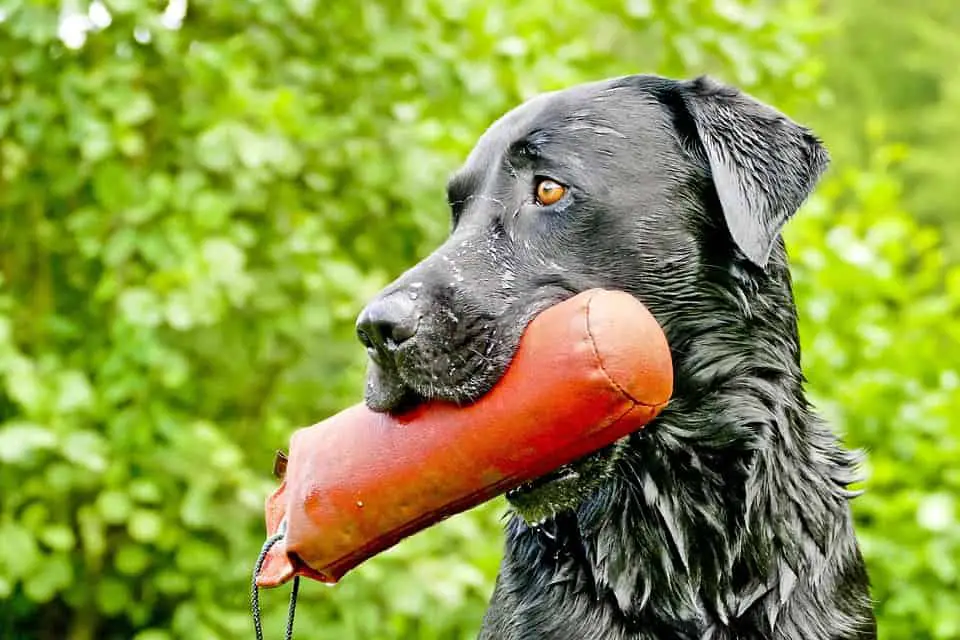So, you’re thinking about getting a Labrador? Well, before diving headfirst into the doggy pool, let’s pump the brakes and explore why you might want to hit the pause button on that decision. Don’t get me wrong, Labradors are bundles of joy and loyalty, but they’re not for everyone. Here are 26 reasons not to get a labrador!!
Labradors Are Big Dogs
Labrador Retrievers may not be the best fit if you prefer small dogs. They are a breed of big dogs that can weigh up to 80 pounds when fully grown.
They require more space and exercise than their smaller counterparts. While Labs are great family pets, they may become too rowdy living in smaller apartments.
Labradors tend to have a lot of energy and need lots of outdoor activities such as running, swimming, or playing fetch to stay healthy and happy. One of the key reasons people choose not to get Labradors is that they can’t meet these demands! Don’t go for labradors if you prefer low-energy lap dogs

Labradors Are Clumsy
Labradors may be adorable, but they aren’t graceful breeds. They are quite clumsy due to their physical traits and high energy levels. Their eagerness to please can lead them to act without thinking, often tripping or stumbling.
Potential owners must know that this breed requires ample exercise and mental stimulation to prevent boredom and destructive behavior.
You’ll Find Labrador Hair Everywhere
Labradors have a thick double coat that helps keep them warm and dry in cold water. This also means they shed a lot. You’ll find their hair on your clothes, furniture, and food! Shedding is a natural process for dogs, but Labradors tend to lose an incredible amount of fur all year round.
Regular brushing will help remove dead hair from the coat and prevent it from scattering. Quality dog food can promote healthy skin and coat conditions, reducing shedding.
Although be warned: if you’re not prepared to deal with Labrador’s hair everywhere, there may be better choices than this breed. Grooming sessions provide an excellent way for owners to bond with their Labs while keeping them looking neat. And let’s face it – who doesn’t love snuggling up with their furry best friend?
So think before adding a lively Labrador into your life, as there will always be tons of hair everywhere!
Labradors Require Lots Of Attention
Labradors are highly social dogs that crave human interaction. They are known for their loyalty and affection. Labradors can become destructive and develop separation anxiety without proper love and attention.
These dogs thrive on human companionship, so a Labrador may not be the best fit if you have a busy lifestyle or work long hours.
You must be prepared to devote plenty of time through exercise, playtime, training sessions, grooming, regular vet check-ups, and more. Remember: owning a dog is a big responsibility and requires commitment!

They Can Trigger allergies!
They are known for shedding large volumes of fur, which can concern potential owners. This can trigger allergies or asthma. However, shedding is a natural process that keeps dogs cool in the summer and warm in the winter.
Before getting a Labrador Retriever as a pet, it’s important to consider whether you’re willing to commit to this extra care.
Labs Require A Lot Of Exercises
Labs are active dogs requiring plenty of exercise to remain healthy and happy. They can quickly become overweight or develop other health problems without adequate training.
A healthy adult Labrador needs at least 80 minutes of high-quality daily exercise to maintain optimal health. A brisk walk or jog is a great way. Playing fetch or swimming are excellent activities that keep them moving and physically engaged.
Tailoring your dog’s exercise routine to fit its needs is crucial. If you’re considering getting a Lab as a pet, you should provide ample daily exercise for this active breed.

This Particular Breed Is Prone To Genetic Problems
Labradors have a high predisposition to genetic problems. Due to inbreeding, Labradors can suffer from various inherited disorders such as hip dysplasia and retinal atrophy. These cause significant pain and discomfort for your Labrador and may require expensive treatments or surgeries.
Labrador Retrievers Are Found On Every Corner And Parking Lot
Labs are incredibly popular. You can spot a lab puppy in every neighborhood. If you are looking for something exotic, then a labrador is not your type. However, their friendly nature makes them very approachable and social animals
Because They Are So Friendly, Labs Can Make Poor Guard Dogs
Labradors are friendly nature and make excellent family pets but not so much for home security purposes.
Because of their low level of aggression and naturally trusting personality, Labs may make poor guard dogs. While Labs can be trained in obedience and basic protection skills, they lack some key traits that make an excellent guard dog.
For one, they tend to be very outgoing towards strangers, showing no signs of territorial behavior or aggression. They also love attention and want to please everyone around them, making it difficult to discern who is a friend or foe.
If you’re looking for a pet that provides companionship and loyalty without the added responsibility of protecting your home, then a Lab might be perfect!

Labs Are Not Clean Dogs
Labs aren’t the cleanest breed out there. They habitually roll around in dirty or smelly places, and their fur quickly gathers dirt. Grooming them regularly, especially during shedding season, is crucial to keep their coats shiny and free from tangles.
Labs drool quite a bit, making a mess wherever they go. If you are okay with putting in some extra effort to groom your pup and maintain your home’s cleanliness level, owning a Labrador won’t be an issue!
Labradors Are Not The Best Lap Dogs
Labs are energetic and playful nature, which may not make them the best lap dogs. Their love of water means they would rather jump into a pond than sit on your lap
However, this does not mean that Labs do not enjoy cuddles or affection from their owners. They are loyal and loving pets who thrive on attention and interaction with their humans.
So while they may not be the best fit for someone looking for an exclusive lap dog, they can still make excellent family pets. Ultimately, whether or not a Labrador is right for you comes down to your lifestyle and preferences.
They Stay In The Labrador Puppy Stage For Years
Labs stay in the puppy stage longer than other breeds. Most puppies grow quickly and reach their full size before their first birthday but continue to develop even after being brought home.
This prolonged puppy stage can be both endearing and frustrating for potential owners. While you’ll have a loyal companion with an adorable personality, you’ll also need to deal with the usual messiness of raising a pup.

Labradors Are Immature For A Long Time
One downside of this breed is that they tend to stay in the puppy stage for years. With their mental age lagging behind their physical growth, it can take up to 4 years for a Labrador to fully mature.
A Labrador is not the best choice if you’re looking for a laid-back companion who will lounge around with you all day. On the other hand, if you’re an active person who enjoys outdoor activities like hiking or running, then a playful Labrador could make a perfect adventure buddy.
Labradors Have Springs In Their Paws!
One fun fact is that they have springs in their paws! This breed has webbed feet, making them great swimmers and retrieving dogs.
Their thick tail also acts as a powerful rudder, helping them easily navigate through water. The springy quality of their paws also comes in handy when jumping and playing. So if you’re considering getting a Lab, be prepared for plenty of bouncing around!
Overall, Labrador Retrievers’ unique physical features make them amazing athletes and companions. But remember that these playful pups need regular exercise to channel all their energy into positive outlets.
It Is Very Hard To Say “No” To Labs
It’s no secret that Labs have a special charm that can melt anyone’s heart. With their irresistible puppy eyes and wagging tails, saying “no” to them is tough. However, labrador owner musn’t melt easily
Labs tend to gain weight quickly if left unattended or overfed. New dog owners must consider these factors before making an impulsive decision or falling for their adorable puppy eyes. Think twice about getting a Lab if you intend on investing less time for proper care and training.

Labradors Are Needy And Will Often Be In Your Way
Labs are a bit needy. They crave attention and affection from their owners and will often follow you around the house! This neediness can lead to frustration when working or getting things done.
However, this behavior is perfectly normal for Labs since they were bred as working dogs and had an innate desire to please humans.
If you want to spend limited time, this breed may not suit you. Otherwise, a Lab could make an incredible addition to any family.
Traveling With Labs Is Difficult
Taking your Lab on trips can be challenging. To avoid destructive behavior, it’s essential to keep them entertained while traveling. Flying with them can become expensive, as many airlines charge an additional pet fee.
Moreover, older Labs may have health issues that could make travel more stressful. For instance, subclinical liver disease is common in Labradors. Their diet must be monitored closely while traveling.
Feeding Quality Dog Food For Labradors Is Expensive
Feeding quality dog food is expensive. While they can eat almost any dry or wet food, providing them with good nutrition is essential for their overall health and well-being.
This means spending more on premium brand dog foods with high-quality ingredients. Puppies have different nutritional needs than adult dogs. Feed Labrador puppies a specific type of food formulated to support their growing bodies.
This specialized puppy food may also come at a higher price than regular adult dog food options.

Labradors Can Tear Up Your Backyard
If they don’t receive enough attention or feel bored, they may resort to destructive behavior like digging holes or tearing up the backyard. Training is essential for preventing this kind of destruction.
Supervising your dog when they’re outside is essential, especially if they tend to be prone to mischievousness.
Training Is A Necessity
Training is a crucial part of owning a Labrador Retriever. It helps you set boundaries and establish authority over your pet. Moreover, it helps the dog learn how to behave around people and other animals.
From online courses and videos to books and expert advice, a new lab owner has plenty of options for finding help.
Labradors Love To Roll Or Wallow In Stinky Stuff
Labs love rolling or wallowing in stinky substances like dead animals and fox poo. This behavior is normal for dogs, not just Labradors. One theory suggests that dogs roll in smelly things to camouflage their scent and sneak up on prey.
Another possibility is that they do it simply because they enjoy the sensation and smell. While this habit can be hard to break, positive reinforcement techniques can help discourage your Labrador from indulging too much.

Labradors Tend To Gain Weight.
Labradors’ tendency to gain weight is one thing that sets them apart from other dog breeds. They have the highest rates of canine obesity.
This is due to a genetic variation associated with appetite and obesity, which affects the POMC or pro-opiomelanocortin gene in Labradors.
You’ll need to be vigilant about your dog’s diet and exercise routine to prevent joint problems and diabetes. Feeding quality dog food designed for Labs may also be necessary, though it can add up the cost.
Labs Are A Single-dog Demolition Team On Flower Beds
Labs can go rogue in your backyard. They have a natural digging instinct that can extensively damage flower beds and gardens.
If you love spending time in your garden and take pride in its appearance, then a Labrador may not be the best dog for you. Plenty of other breeds, such as poodles or terriers, may be better suited for those who enjoy gardening.
Separation Anxiety
Separation anxiety can be a significant issue for labs. Dogs suffering from separation anxiety may show distress when left alone, such as constant barking or destructive behavior.
Teaching the dog that every departure is not a final goodbye is vital. This involves conditioning the dog to understand that leaving doesn’t necessarily mean abandonment.

Noisy
Sudden loud noises can trigger fearful behaviors in these dogs. Over 77% of Labrador owners report that their dogs do not bark or only bark sometimes. Sometimes it can be very noisy as they continue barking in spurts.
Having a noisy dog might be avoided with careful attention during puppyhood!
Pee Spots In Your Yard
Unfortunately, their urine leaves unsightly yellow spots on your grass that can be difficult to remove. These spots are caused by the nitrogen and salts present in dog urine.
While male and female dogs can cause these spots, males tend to spread their urine over a larger area due to territorial marking. Repeated exposure to dog urine can also kill your grass, making finding ways to prevent or treat these pee spots essential.
In conclusion, there are many reasons why not getting a Labrador Retriever might be the right choice for specific individuals or families. However, with proper training and care, these dogs can make wonderful companions known for their friendly nature and loyalty towards their owners.
It’s up to each person considering bringing home one of these lovable pups to weigh the pros and cons before deciding.
FAQ
Why Is Your Retriever Not Listening Or Ignoring You?
- One possible explanation is that they are easily distracted and overwhelmed by their surroundings.
- Another reason may be improper training or lack of consistency in training.
Establishing a strong bond through positive reinforcement and consistent training techniques is vital to make your retriever listen to you.
This includes setting clear boundaries and rules, rewarding good behavior, and using firm but gentle correction when necessary. Regular physical activity with your dog can also help build trust and improve obedience. Seeking the advice of professional trainers can provide further guidance on improving communication with your beloved pet.
How Can I Make My Retriever Listen To Me?
Training is the key to get a Labrador to listen to you. Consistency and patience are essential.
- One effective way to train your dog is using positive reinforcement, such as treats or praise, for good behavior.
- Establish yourself as the pack leader in the household. Set boundaries and consistently enforce them.
- Providing adequate exercise and mental stimulation for your retriever can help them focus better during training sessions.
- Every dog learns differently, so finding what works best for your Lab may take trial and error.
But with dedication and effort from both you and your furry friend, they will start listening attentively before you know it!
Are Labradors Difficult Puppies?
Labrador puppies can be quite a handful, and many new owners are overwhelmed by their energy levels. These pups are known for being exuberant and boisterous, which can make them challenging to train.
They love to please and need lots of exercise and mental stimulation to stay engaged. With proper training and socialization, most Labradors grow from their rambunctious puppy phase by 2 or 3.
Which Color Labrador Is The Calmest?
There is no definitive answer to which color Labrador is the calmest. It is not solely dependent on coat color. Breeding plays a crucial role in determining a Lab’s temperament.
Some studies suggest that black Labs are considered the calmest. Yellow Labs are also known for having a calmer personality than their chocolate counterparts.
What Is Better, A Girl Or A Boy Labrador?
When choosing between a female or male Labrador, there are some differences to consider. Female puppies tend to mature faster and have better attention spans, making them easier to train in general.
However, male Labradors are often more affectionate and love being around their human companions. It’s also important to note that female Labs typically grow up to be smaller than males – by about 15-20%.
If you prefer a larger dog, a male may be the way to go.
What Color Lab Is The Most Hyper?
According to anecdotal evidence, chocolate-colored Labradors have a reputation for being the most hyperactive of all colors. However, studies show no scientific evidence to support this claim.
A dog’s behavior and personality are more closely linked to its upbringing and training than its coat color. While some breeders may promote one color over another regarding energy levels, every dog has unique personality traits.
Researching the breeder carefully and meeting the puppy’s parents before deciding to bring a new pet into your home is necessary.
Are Labradors good family pets?
Yes, Labradors are generally good family pets. They are known for being friendly, outgoing, and patient. They are also relatively easy to train and are good with children.
Why are labs so needy?
Labradors may be needy for the same reasons that they are clingy. They are bred to be working dogs, may have separation anxiety, or may not get enough exercise or mental stimulation.
Another reason why Labradors may be needy is because they are very loving and affectionate dogs. They simply want to be around their people and make them happy.
Why are labs so clingy?
There are a few reasons why Labradors may be clingy. One reason is that they are bred to be working dogs. This means they are used to being around people and helping them with tasks. As a result, they may crave companionship and attention.
Another reason for clinginess is separation anxiety. Separation anxiety is a common condition in dogs that causes them to become distressed when they are separated from their owners. Labradors are particularly prone to separation anxiety because they are so attached to their people.
Finally, Labradors may also become clingy if they are not getting enough exercise or mental stimulation. A bored or under-stimulated dog is likelier to engage in unwanted behaviors, such as seeking attention from its owners.
Author Profile

- Lifetime dog Enthusiast
- Shradha is a seasoned writer at Labradorandyou.com, an authoritative resource for all things Labrador Retriever. Her experience as a pet owner and dog enthusiast drives her to create meticulously researched and fact-checked content, offering valuable insights on Labrador training, grooming, and health. Each article reflects Shradha's passion and dedication, enriched by personal experiences with her beloved Labradors, Tom, and Kurt. Whether exploring breed-specific training techniques or providing product reviews, Shradha ensures Labrador owners receive the most accurate, up-to-date, and trustworthy information, aimed at enhancing their companions' health and happiness
Also by the author
-
 1winRussiaJune 30, 2025Как Распознать Мошенничество в Онлайн Казино
1winRussiaJune 30, 2025Как Распознать Мошенничество в Онлайн Казино
-
 Lab-TypesJune 29, 2025Apostas Desportivas Online Login 1xbet 1xbet Com
Lab-TypesJune 29, 2025Apostas Desportivas Online Login 1xbet 1xbet Com
-
 casinoJune 29, 2025Легальные Букмекерские Конторы же России 2025 Топ 15
casinoJune 29, 2025Легальные Букмекерские Конторы же России 2025 Топ 15
-
 Lab-TypesJune 29, 2025Play & Win With $6000 Bonus
Lab-TypesJune 29, 2025Play & Win With $6000 Bonus





